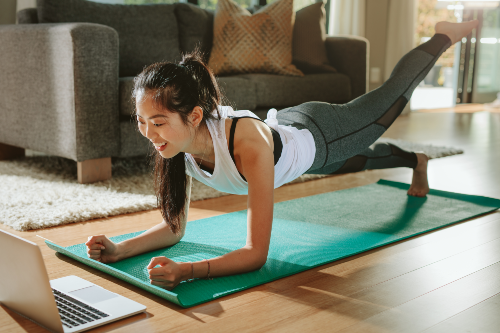Earlier this year, top health and fitness professionals named HIIT, or high-intensity interval training, among the top five fitness trends for 2020. And while the high-impact workouts have been proven to increase aerobic fitness, establish and sustain healthy blood pressure and reduce body weight while maintaining muscle mass, some orthopedic surgeons are warning that the idea of no pain, no gain could go too far.
“For those looking to add a bit more excitement to their workout, HIIT may be an option,” said Thomas S. Muzzonigro, MD, FAAOS, spokesperson for the American Academy of Orthopaedic Surgeons (AAOS). “The goal of high-impact interval training is low volume and high intensity; it’s tough, but effective when done right. It’s worth remembering that like any form of exercise, you should not push yourself past your level of fitness and stop if you feel pain.”
According to the “Worldwide Survey of Fitness Trends for 2020” published in the November/December issue of the American College of Sport Medicine’s Health & Fitness Journal, HIIT training is made up of bursts of all-out exercise followed by short periods of rest for recovery. It has ranked among the report’s top five most popular fitness trends since 2014. Whether taking a group HIIT fitness class or working out at home, HIIT can be performed anywhere and completed within a short period of time.
To help participants get the most out of HIIT, the orthopedic surgeons at the AAOS suggest the following five tips to help protect your knees, joints and musculoskeletal frames:
1. Self-assess and stretch: When starting any workout program, start with an assessment from a trained professional to determine your level of fitness, focusing on flexibility, core conditioning and posture. Ask yourself, what can you realistically accomplish? What is the baseline starting point and how can you challenge yourself? If you have a relatively seditary lifestyle, check with a physician before beginning an exercise routine.
2. Start slow and build up: Always warm-up the muscles with five to ten minutes of stretching. Any explosive HIIT exercises you’ve heard about can be modified. If you don’t feel comfortable with an exercise, don’t be intimidated. Ask an exercise professional or refer to a reputable online source for a modification. For example, a reverse lunge instead of a jump lunge, wall slide instead of a squat, half-jack instead of jumping jack.
3. Less focus on reps and more focus on form: With HIIT, one of the goals is to move quickly. Combine speed with fatigue and you may start to sacrifice proper form, which makes the likelihood of injury greater. Muzzonigro notes that a form-first, speed-second approach is key to any workout. Completing half the number of squats correctly in the designated amount of time with intensity is better than rushing. If you can’t sustain multiple rounds of the perfect exercise, focus on your form and increase the repetition as the rounds progress.
4. Jump softly: To avoid strain on hip and ankle joints, softly land jumps with your knees slightly bent. If your knees are straight, then all the impact falls on cartilage.
5. Hydrate and healthy diet: Keeping your energy and performance levels up means you’ll not only get a better workout, but you’ll also avoid potential injuries or setbacks. Drinking water prior to HIIT and in small quantities throughout will help avoid dehydration which can be damaging to your health.
“It’s important to tailor a workout to your body,” added Dr. Muzzonigro. “If you have back, hip or knee issues, or arthritis, sprinting and jumping can be painful and cause joint pain. Consider swimming or stationary cycling as good alternatives that still give you the option to create periods of exertion and recovery which are key to HIIT.”
The AAOS recommends that any fitness goers talk with an orthopedic surgeon or their general practitioner about the safety of beginning an interval training program or a new workout.
Information for this article was provided by the AAOS. For more information about the
benefits of creating a balanced fitness routine, visit OrthoInfo.org.

